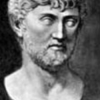Lucretius

Lucretius
Titus Lucretius Caruswas a Roman poet and philosopher. His only known work is the epic philosophical poem De rerum natura about the tenets and philosophy of Epicureanism, and which is usually translated into English as On the Nature of Things...
NationalityRoman
ProfessionPoet
names goes-on body
And thus thou canst remark that every act At bottom exists not of itself, nor is As body is, nor has like name with void; But rather of sort more fitly to be called An accident of body, and of place Wherein all things go on.
time names degrees
No single thing abides; but all things flow. Fragment to fragment clings - the things thus grow Until we know them and name them. By degrees They melt, and are no more the things we know.
mother sea names
If anyone decided to call the sea Neptune, and corn Ceres, and to misapply the name of Bacchus rather than to give liquor its right name, so be it; and let him dub the round world "Mother of the Gods" so long as he is careful not really to infest his mind with base superstitions.
law sky names
I prove the supreme law of Gods and sky, And the primordial germs of things unfold, Whence Nature all creates, and multiplies And fosters all, and whither she resolves Each in the end when each is overthrown. This ultimate stock we have devised to name Procreant atoms, matter, seeds of things, Or primal bodies, as primal to the world.
children men names
Nature impelled men to make sounds with their tongues And they found it useful to give names to things Much for the same reason that we see children now Have recourse to gestures because they cannot speak And point their fingers at things which appear before them.
stones doe heavy
If God can do anything he can make a stone so heavy that even he can't lift it. Then there is something God cannot do, he cannot lift the stone. Therefore God does not exist.
bitter food
What is food to one is to another bitter poison.
food man
What is food to one man is bitter poison to others.
lying mind atheism
True piety lies rather in the power to contemplate the universe with a quiet mind.
fortune morrow doubtful
It is doubtful what fortune to-morrow will bring. [Lat., Posteraque in dubio est fortunam quam vehat aetas.]
light wind white
The gods and their tranquil abodes appear, which no winds disturb, nor clouds bedew with showers, nor does the white snow, hardened by frost, annoy them; the heaven, always pure, is without clouds, and smiles with pleasant light diffused. [Lat., Apparet divom numen, sedesque quietae; Quas neque concutiunt ventei, nec nubila nimbeis. Aspergunt, neque nex acri concreta pruina Cana cadens violat; semper sine nubibus aether Integer, et large diffuso lumine ridet.]
law fixed all-things
All things obey fixed laws.
men understanding mind
How wretched are the minds of men, and how blind their understandings. [Lat., O miseras hominum menteis! oh, pectora caeca!]
infinite endless everlasting
All things keep on in everlasting motion, Out of the infinite come the particles, Speeding above, below, in endless dance.